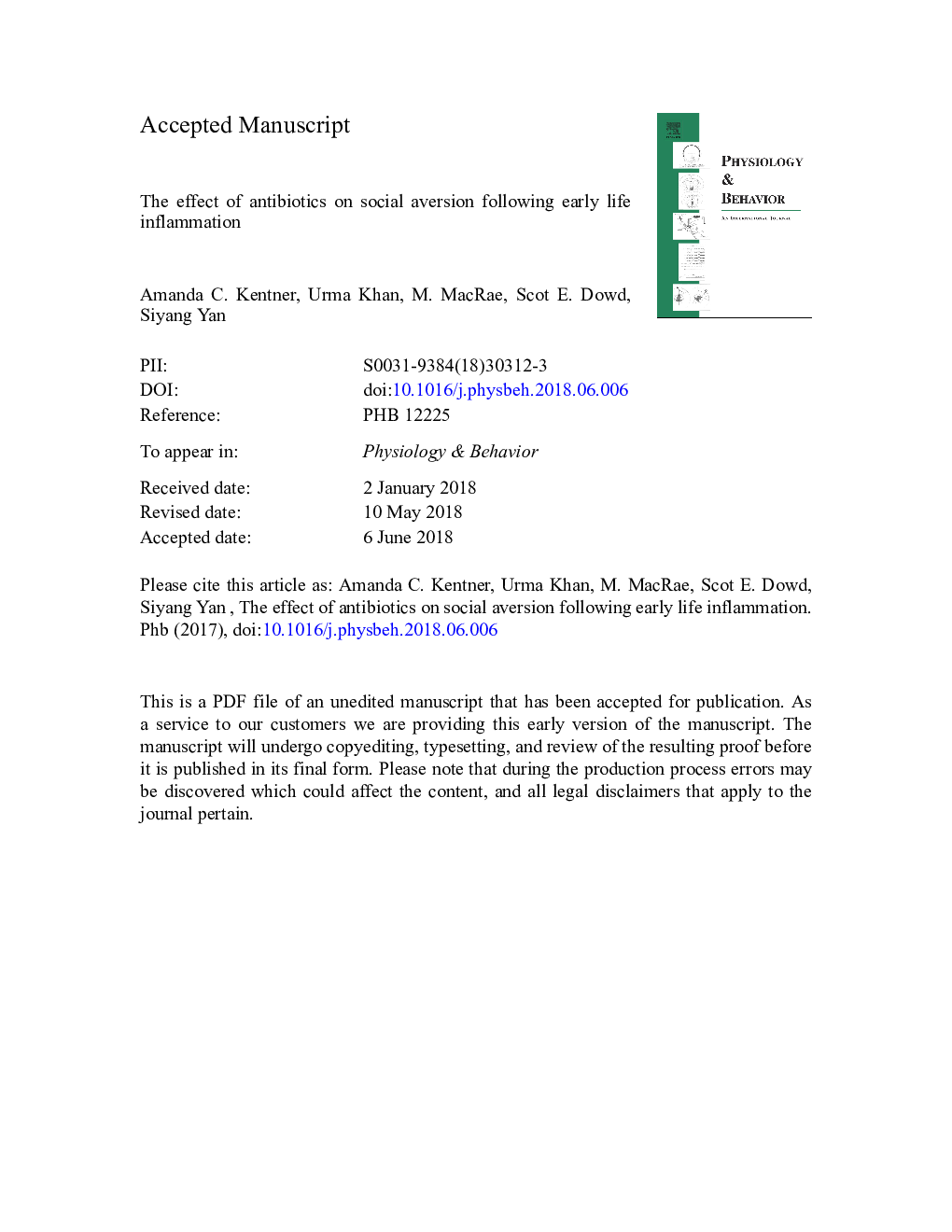| کد مقاله | کد نشریه | سال انتشار | مقاله انگلیسی | نسخه تمام متن |
|---|---|---|---|---|
| 8650289 | 1571124 | 2018 | 36 صفحه PDF | دانلود رایگان |
عنوان انگلیسی مقاله ISI
The effect of antibiotics on social aversion following early life inflammation
ترجمه فارسی عنوان
تأثیر آنتی بیوتیک ها در بروز نگرانی اجتماعی پس از التهاب زودهنگام زندگی
دانلود مقاله + سفارش ترجمه
دانلود مقاله ISI انگلیسی
رایگان برای ایرانیان
کلمات کلیدی
میکروبیوم، آنتی بیوتیک ها، انزوای اجتماعی، اولویت اجتماعی، پرخاشگری، التهاب تفاوت جنسی، اکسیتوسین،
موضوعات مرتبط
علوم زیستی و بیوفناوری
بیوشیمی، ژنتیک و زیست شناسی مولکولی
فیزیولوژی
چکیده انگلیسی
Epidemiological evidence suggests that exposure to infection during early development increases the risk for neurodevelopmental disorders associated with symptoms such as a decreased desire to engage in social interactions. In animals, disruptions in social behavior can be modelled by administering bacterial mimetics such as liposaccharide (LPS). However, when evaluating social interactions in the laboratory, attention is rarely directed on the reciprocal relationship as a whole, which is important as peers may drive social withdrawal. Previously, we have shown that male adolescent rats treated neonatally (n) with LPS receive less contact from their conspecifics in a social interaction test, and that this effect is mediated through olfactory communication. In the present study, we reconfirmed this effect using a more direct social test and evaluated the hypothesis that changes in the microbiome underlie the olfactory induced social aversion. Male and female Sprague-Dawley rats were administered nLPS (50â¯Î¼g/kg, i.p) or nSaline on postnatal days (P)3 and 5. On P40, adolescent nLPS treated males received less contact in a social preference test compared to nSaline treated controls, an effect not observed in females. To confirm that nLPS led male rats to elicit a scent cue, resulting in social aversion, a subset of neurotypical conspecifics underwent an anosmia procedure that disrupted their olfactory processing via olfactory neuroepithelium degeneration. This normalized the contact that they directed towards nLPS and nSaline male rats. Although 16â¯s rRNA sequencing failed to detect significant differences in bacterial phyla across either sex or neonatal treatment, treating male nLPS rats with an antibiotic cocktail, which induced clear changes in microbial communities, diminished the social rejection effect. Therefore, manipulation of the microbiome appears to affect social communication where there exists an underlying deficit. Moreover, our data reaffirm that social engagement is a reciprocal process and the behavior of all individuals within a dynamic interaction should be evaluated.
ناشر
Database: Elsevier - ScienceDirect (ساینس دایرکت)
Journal: Physiology & Behavior - Volume 194, 1 October 2018, Pages 311-318
Journal: Physiology & Behavior - Volume 194, 1 October 2018, Pages 311-318
نویسندگان
Kentner Amanda C., Khan Urma, MacRae M., Dowd Scot E., Yan Siyang,
